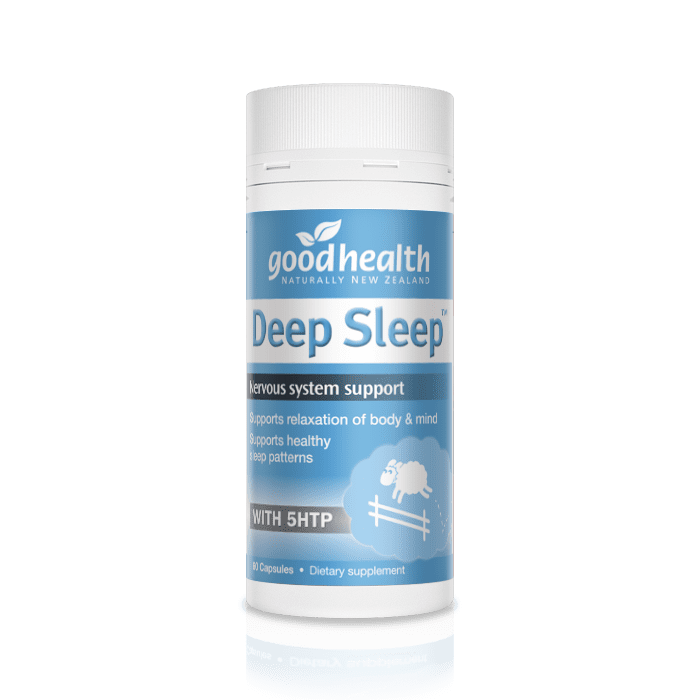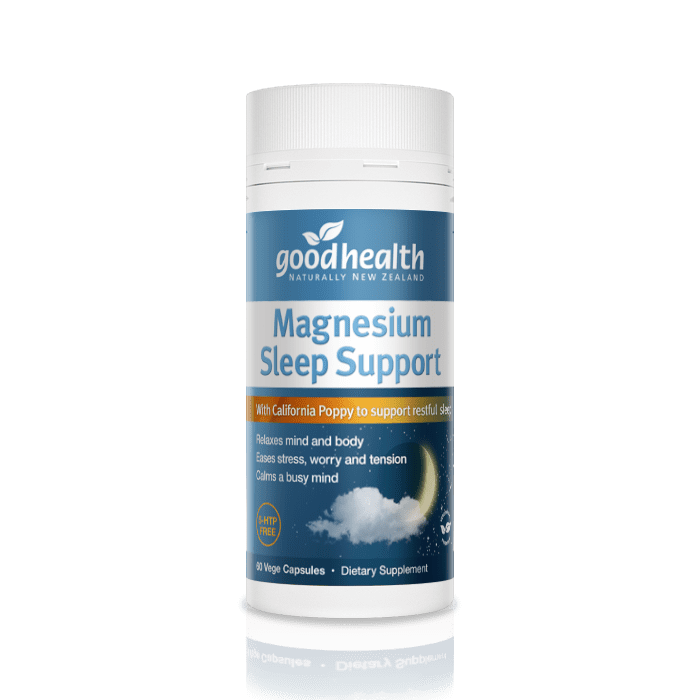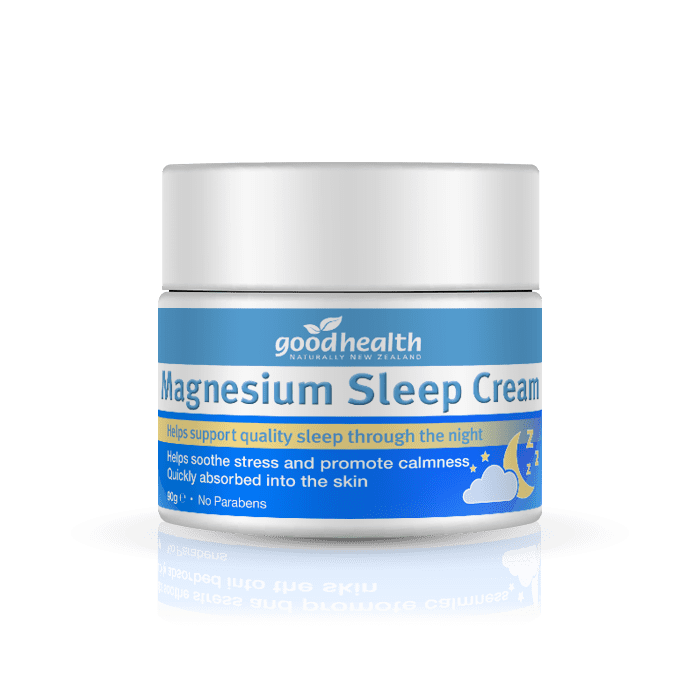
The frustration of sleepless nights can be common for many ages and stages through life. Healthy sleep patterns can be hard to grasp if you’re in the new baby phase or life, or quite frankly, the young children phase of life. Another common phase of life is perimenopause and menopause, but also just the busy, demanding world that we live in can leave us struggling to go to sleep and stay asleep.
But don’t despair, support is here, in this article we’ll discuss 7 easy-to-action tips for supporting healthy sleep patterns, plus our favourite supplements that support deep sleep naturally.
Why Can’t I Sleep? Common Causes of Sleep Struggles
It’s 2am and you’re tossing and turning and getting more frustrated that you can’t seem to fall back to sleep. Or maybe you went to bed early but now you’ve been lying there wide-awake thinking why can’t I sleep at night even when I’m tired. Let’s break down some common causes:
-
Stress and a busy mind
One of the most common causes of poor sleep is stress. The highly demanding, fast-paced lifestyle leaves us in a stressed state and unable to switch off, this is called a dysregulated nervous system. Stress can trigger racing thoughts at night as your brain tries to sort and file and with the elevated levels of cortisol and adrenalin which increase alertness, the combination can leave you finding it hard to unwind at night.
-
Lifestyle habits and light pollution
As we try to fit more and more into our lives, we end up having irregular routines, working on our computers at night or just mindlessly scrolling on our phones in an effort to relax. Then, poor sleep ensues and the next day you end up over-caffeinated, wired but tired, and the whole routine starts again the next night…it’s a vicious cycle.
Light pollution and in particular blue and green light that’s emitted from screens such as phones, tv’s, computers and even LED downlights are creating havoc with our circadian rhythm. Blue light messes with our brain and disrupts our sleep hormone, and therefore, our natural sleep – wake cycle so it’s important that we address this if we want to have a sound night’s sleep. Check out the next section for helpful tips!
-
Body rhythm disruption
Following on from the light pollution that disrupt your body’s natural rhythm, there are other disrupters such as shift work, travel and just general poor bedtime routines and non-existent sleep hygiene practices. Our bodies are designed with routines in mind, day-night cycles, seasonal cycles, menstrual cycles just to name a few. The more you can have a reliable routine in your daily life the better.
-
Nutrient factors
We all know that caffeine can negatively affect our sleep, but so can alcohol, eating later at night and consuming high sugar foods in the evening can also contribute to poor nights sleep. Certain deficiencies, such as low magnesium levels in the body can affect the body’s ability to relax and therefore contributes to poor sleep. Making sure you are getting the balance of protein, carbohydrates and fats throughout your day can help the body get the fuel its needs for the daytime but also for the jobs it needs to do whilst your sleep.
Now we’ve identified a few of the common culprits, let’s look at some great tips to support a better night’s sleep!

7 Lifestyle Changes to Support Healthy Sleep
1. Circadian rhythm and natural light
The #1 area to focus on is getting your circadian rhythm back to normal. To do this, use natural light as your guide because it guides the receptors in your eyes and skin, so you naturally fall back into rhythm. Natural light in your eyes within 30 minutes of waking, pop outside for 10 minutes around 10am and then add a 10-minute walk after lunch and so on…this way your body is receiving the cues from nature about what time it is. Then of course, in the evening reduce any artificial light as much as possible and read the next tip on how to manage blue light.
2. Limit screen time
As discussed earlier, harmful blue light from devices and certain lights disrupt our sleep hormone, so limiting this by wearing blue blocking glasses or just switching off the device an hour before bed can all support healthy sleep patterns. Remember, it’s not just the blue light that can disrupt our sleep, it maybe the content that you’re watching (a scary movie or 20 second TikToks), or if you’re working on your laptop, it can create a stress response in the body. So…on to the next tip…
3. Create a calming bedtime routine
An hour or two before bed set an alarm to signal to you it’s time to start winding down. Read a book, play some relaxing music, do some drawing or even do some gentle stretches. A 10-minute bedtime yoga routine can have many benefits to unwinding the body and mind; to regulate the nervous system ready for sleep, try it by candlelight!
4. Set a sleep schedule
Going to bed and waking up at similar times is important to our natural cycles. Choose your wake-up time and count backwards for 8 hours, then add another hour on to give you a buffer for that falling asleep time. For example, if you have to get up by 7am, you need to be in bed by 10pm and asleep by 11pm to get your 8 hours of sleep.
5. Move your body daily
Gentle exercise can support natural sleep rhythms. It can be hard to get started with exercise when you’re not sleeping well, so start small and build on the habit. Go for a 10-minute walk in the morning while you get that morning natural light in your eyes or try a 10-minute walk after lunch to balance your blood sugar. More strenuous exercise may even increase your need for sleep and support sleep quality. Although its not advised to do strenuous workouts before bedtime!
6. Fill those nutrient gaps
Making sure you are eating all the macronutrients (protein, carbs and healthy fats) you need as well as the micronutrients (vitamins, minerals, antioxidants etc) from whole foods throughout the day. If you’re looking for a small snack after dinner, make it one that contains tryptophan because it’s an amino acid precursor of serotonin and your sleep hormones. Foods like banana paired with a little almond butter, yogurt paired with blueberries, or even a boiled egg.
7. Mindful stress management
Making a conscious effort to manage our stress is one of the best things you can do for your health. And the best thing is the most effective ones are free! Breathing exercises and journaling are two of the best mindfulness practices there are.
You can check out several different breathing exercises in this article, but one of the most common ones is Box Breathing: Breath in for 4 counts, hold for 4 counts, Breathe out for 4 counts and hold for 4 counts and repeat for several cycles.
A really effective journaling practice called a Brain Dump can help to “dump” all your thoughts out of your mind and on to paper, it’s an effective practice to do before bed so you’re not ruminating on conversations or thinking about your To-Do List when in bed.
There are many small changes you can do to support your sleep and if you have been making changes and sleep still alludes you then you may consider a natural supplemental support.
Natural Supplements that Support Sleep
Good Health Deep Sleep
A unique formulation of 5-hydroxytryptophan (5-HTP) and herbs that work together to support relaxation and sleep. Deep Sleep contains a plant derived extract of 5-HTP, providing the precursor to support serotonin production in the body. Deep Sleep can support sound sleep and a balanced mood, naturally, with added magnesium and vitamin B6. Also included are the herbs passionflower, Californian poppy, and Jamaican dogwood to effectively support the nervous system and normal sleep patterns and help relax the mind and body.
Take 1 to 3 capsules, 1 hour before bed.

Good Health Magnesium Sleep Support
Comprehensive formulation containing 3, easily absorbed forms of magnesium: marine, citrate, and chelate, in combination with a blend of nervous system and stress-supporting ingredients, California poppy, ashwagandha, passionflower, and vitamin B6. California poppy supports healthy sleep patterns by supporting consistent sleep throughout the night. California poppy is similar to magnesium in its muscle relaxing effects. Ashwagandha, a traditional Ayurvedic herb, supports the body to adapt and cope with stress. Passionflower supports the nervous system and soothes a busy mind. B6 supports healthy neurotransmitter production and the absorption of magnesium.
Taken 60 minutes before bed to support a good night’s sleep.

Good Health Magnesium Sleep Cream
Helps to soothe the senses and support a quality night-time sleep. Zechstein™ Magnesium Chloride is bioavailable and pure magnesium oil that is naturally sourced from ancient seabeds and easily absorbed through the skin. Lavandula Angustifolia (lavender) supports relaxation and has a calming effect on the body physically and emotionally. It is a popular aromatherapy remedy for supporting sleep and easing restlessness. Chamomile flowers support a calm mind and nervous system, as chamomile is a soothing herb that is commonly used to support destressing and a peaceful night’s sleep. A non-greasy cream for easy application whenever you need to relax.

Your Path to Restful Nights
Small changes add up, such as many things in life! When you’re tired from a poor night’s sleep, then only way forward is to make one small change at a time. Take an honest look at your habits and choose one thing that might move the needle the most for you.
Is it shutting off your device at 8pm and curling up with a good book?
Is it getting up in the morning to see the sunrise and going for a short walk outside to balance your circadian rhythm?
If you need the added support of a quality nutritional sleep supplement that’s non-habit forming, then look to the Good Health Sleep range and explore our natural sleep support options that fit your new sleep routine. Sweet dreams!
Sometimes ongoing sleep problems may need professional guidance, so we encourage you to check in with your healthcare professional if sleep issues persist.
请务必阅读标签并遵守使用说明。维生素和矿物质补充剂不应取代均衡饮食。如果症状持续存在,请就医。如需了解更多信息,请致电 0800 446 634 联系我们的自然疗法师,或访问 www.goodhealth.co.nz Good Health, NZ, Auckland。
